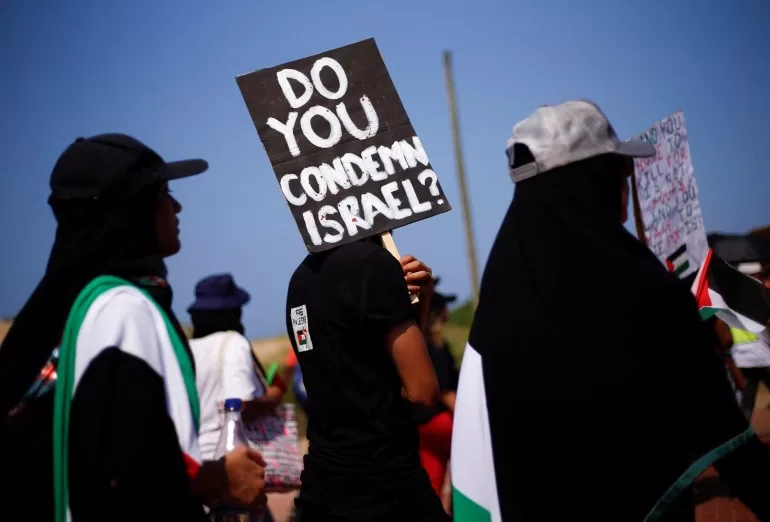Back at home, though, the support was more muted among the country’s other political parties. The ANC’s main rival at the time, the right-leaning Democratic Alliance (DA), opposed the step — although it subsequently asked Israel to adhere to the ICJ’s interim rulings. The right-wing populist Patriotic Alliance (PA) called South Africa’s move a “joke”.
Now, five months later, the ANC has stitched together a coalition government to rule the country with the DA and to a lesser extent the PA and the nationalist Inkatha Freedom Party (IFP), raising concerns about how South Africa’s approach to Israel and Palestine may change.
The ANC fell short of a majority in May elections for the first time since the end of apartheid.
The ANC insists that it will not change its position in support of Palestine despite the new coalition agreement.
Yet analysts argued that a coalition-led South Africa may need to make internal trade-offs in pursuing its Palestine policy after months of leading global efforts to hold Israel accountable for its assault on Gaza, which has killed more than 37,000 people.

‘Will the ANC abandon its foreign policy?’
The DA and IFP have sought to remain neutral on the war while the PA in particular has expressed support for Israel.
In the final coalition agreement, a clause on foreign policy was inserted in which the ANC and its partners agreed on the principles that foreign policy would be based on.
“Foreign policy based on human rights, constitutionalism, the national interest, solidarity, peaceful resolution of conflicts, to achieve the African Agenda 2063, South-South, North-South and African cooperation, multilateralism and a just, peaceful and equitable world,” the agreement read.
While the ANC has conceded that the DA is unlikely to change its position on Israel and Palestine, it insisted that it would not give up its longstanding solidarity with Palestinians.
“Will the ANC abandon its ideas on foreign policy? We are not going to change that. Will the DA change from what it represents? It will not change that,” ANC Secretary-General Fikile Mbalula told the media.
He labelled suggestions that the ANC may backtrack on its critical stance against Israel as “misleading and populist”.
“We will continue to show solidarity with the people of Palestine. It was not an election stance,” Mbalula insisted.
South Africa’s support for Palestine is deeply rooted in its own decades-long struggle against apartheid with President Cyril Ramaphosa repeatedly labelling Israel an apartheid state.

Double standards
The DA has moved away from its initial steadfast support for Israel and has maintained a middle ground call for “peace”.
In the run-up to the elections, the ANC criticised the DA for taking a bold stance on the Ukraine war – DA leader John Steenhuisen travelled to Kyiv in a show of support against Russia’s war – while not taking a similar stance in support of Palestine.
The DA, in turn, accused the ANC of not being principled in its foreign policy as a result of what it dubbed a “cosy” relationship with Russian President Vladimir Putin.
The ANC government has condemned Russia’s invasion of Ukraine, and Ramaphosa has sought to play a peacemaking role in the conflict but remains friendly with Putin and Russia.
While the ANC signed the agreement with its coalition partners that saw the re-election of Ramaphosa on Friday, it asserted its solidarity with Palestine at Ukrainian President Volodymyr Zelenskyy’s global peace summit in Switzerland but took a hard line against Israel.
South Africa’s representative to the summit, Sydney Mufamadi, who is Ramaphosa’s national security adviser, rejected the final communique because of Israel’s participation.
In a statement after the summit in Burgenstock, Mufumadi called out what he said were international double standards in uniformly and fairly implementing international law.
He said he found it surprising that Israel was present and signed the communique “just a few days after a credible high panel committee appointed by the United Nations found that it has, amongst the commission of other atrocity crimes, committed the crime of extermination”.
‘ANC is reliant on the DA’
Siphamandla Zondi, a professor of politics and international relations at the University of Johannesburg, said that while the ANC, as a party, will not abandon its position on Palestine, it will have to compromise on government actions.

“I think that the ANC might not be able to pursue with its litigations and really pushing very strongly against Israel,” he told Al Jazeera.
“It might revert to kind of like a principal position that says, ‘This war must end,’ almost similar to the position on Ukraine.”
At the ICJ, South Africa has accused Israel of genocide, and its case has been supported by more than a dozen countries.
While the DA was initially critical of the government’s decision to take Israel to the ICJ, it said it would abide by the court’s decision on the matter. Zondi said the DA’s stance on Palestine was consistent with centre-right parties across the world and, while they condemn the violence, they were not comfortable calling Israel’s actions a genocide.
“The coalition agreement will definitely affect the government’s case at the ICJ. The ANC is reliant on the DA,” he said.
Zondi said that while it was unlikely the ANC would give up the international relations ministerial portfolio to its coalition partners, the DA would influence policy decisions.
According to the coalition agreement, decisions in the unity government will have to be taken through “sufficient consensus” with the support of 60 percent of the parties in the agreement. This means that the ANC will not be able to make decisions by itself. If the ANC and IFP agree on something but the DA disagrees, a decision could pass; but if DA and IFP both disagree, the ANC cannot act alone.
